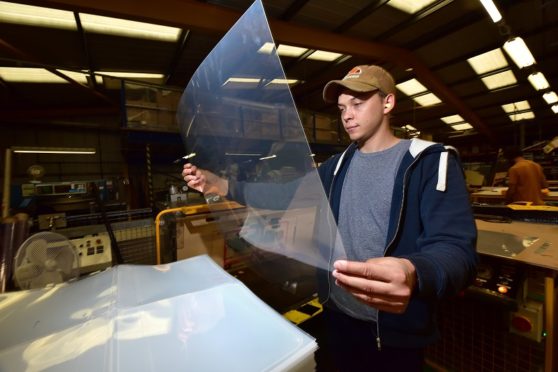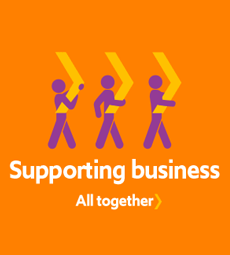
Throughout the COVID-19 pandemic, the UK Government has continued to act with speed to protect Scottish companies and safeguard jobs.
The Kickstart scheme, currently underway, is one such way of getting the country’s young people into a job. This is how the initiative works and who it is aimed at.
Useful links
A new scheme to help young people in Scotland into work and boost the country’s economic revival has been launched by the UK Government. Businesses are now able to sign up to be part of the landmark £2billion Kickstart scheme, giving unemployed young people a future of opportunity and hope by creating high-quality, government-subsidised jobs.
Under the scheme, announced by Chancellor Rishi Sunak as part of his Plan for Jobs, Scottish employers can offer youngsters aged 16 to 24, who are claiming Universal Credit, a six-month work placement.
The Government will fully fund each Kickstart job by paying 100 per cent of the age-relevant National Minimum Wage, National Insurance and pension contributions for 25 hours a week.
Employers will be able to top up this wage, while the UK Government will also pay employers £1,500 to set up support and training for people on Kickstart placements, as well as helping pay for uniforms and other set up costs.
The jobs will give young people – who are more likely to have been furloughed, many working in sectors disproportionately hit by the pandemic – the opportunity to build their skills in the workplace and gain experience to improve their chances of finding long-term work.
The Chancellor said: “This isn’t just about kickstarting our economy – it is an opportunity to kickstart the careers of thousands of young people who could otherwise be left behind as a result of the pandemic.”
The scheme will open the door to a brighter future for a new generation, helping Scotland bounce back stronger as a country.
Secretary of State for Scotland Alister Jack said: “The UK Government’s Kickstart scheme will give young people in Scotland the support they need at this difficult time. The £2 billion Kickstart scheme will create thousands of high quality jobs for young people with the UK Government directly subsiding wages for six months. Young people will also get additional support through the Jobcentre network. I urge employers in Scotland to sign up to this.”
Businesses of all sizes looking to create quality jobs for young people can apply and there is no cap on the number of places. Household names including Tesco and The Prince’s Trust are among those who have already pledged to offer Kickstart jobs.
The scheme, being delivered by the Department for Work and Pensions, will initially be open until December 2021 with the option of being extended.
As part of the plan to support jobs, a Job Retention Bonus will be introduced to help firms keep furloughed workers. All Scottish employers will receive a one-off bonus of £1,000 for each furloughed employee who remains continuously employed through to the end of January 2021.
Employees must earn above the Lower Earnings Limit (£520 per month) on average between the end of the Coronavirus Job Retention Scheme and the end of January 2021 with payments made from February 2021.

Winter Economy Plan
In his Winter Economy Plan the Chancellor announced more measures to try to prevent mass job losses across the UK when the Jobs Retention Scheme ends at the end of October.
The three main pillars of the plan of the UK Government’s new Job Support Scheme, expected to cost an estimated £500 million, are:
- Supporting viable jobs, making sure that employees must work a third of their normal hours, paid as normal by the employer, with a top-up provided by the UK Government.
- Six months of targeted support at firms that need it the most – mostly smaller and medium sized businesses – with larger firms allowed to apply if turnover has fallen.
- Extending the existing self-employment grant as it currently stands.
‘A great chance to build momentum’
A Scottish company CEO praised the UK Government’s Kickstart scheme as a “great opportunity”. James Vargo, Chief Executive of Edinburgh-based DirectID, hopes to take on 30 recruits thanks to the initiative. His fintech firm, supplying bank data products to customers across more than 30 countries, has been operating for a decade.
Companies use DirectID to verify the identity of their customers or applicants, carry out regulatory and compliance checks such as Anti-Money Laundering and Know Your Customer, also assessing affordability and spending patterns.
DirectID connects to more than 13,000 banks globally, having customers across the UK, Europe and continental America.
It gives the user the ability to do more online, by taking trusted data in your bank account and using it to access additional services.
“The Kickstart scheme is a great opportunity,” said Mr Vargo, originally from Vancouver, based in the UK for 24 years.
“We have actually just stretched ourselves and put in an application for 30 people”.
He hoped they could entice other fintech companies to join the bid but, when that did not happen, “we decided to go for it any way and play our part.”

DirectID already employs 25 people with company revenues having doubled this year, allowing the operation to more than double its workforce by taking on 30 job-seekers.
“There is a buzz around this kind of business right now and it is a good time to expand,” he explained.
DirectID is using the Kickstart scheme to recruit across the board, including sales and marketing roles, data insights and data analysis positions.
Mr Varga encouraged other Scottish firms to embrace the scheme, seeing it as an opportunity to build more momentum in fintech – one area that has increased amid the current pandemic.
The UK Government hopes that, after the six months, those on the scheme will become permanent staff.
“If we can use this to find some people, and it’s all productive and effective, then absolutely we will look to keep them on,” he added.
Find out more here.

Enjoy the convenience of having The Sunday Post delivered as a digital ePaper straight to your smartphone, tablet or computer.
Subscribe for only £5.49 a month and enjoy all the benefits of the printed paper as a digital replica.
Subscribe